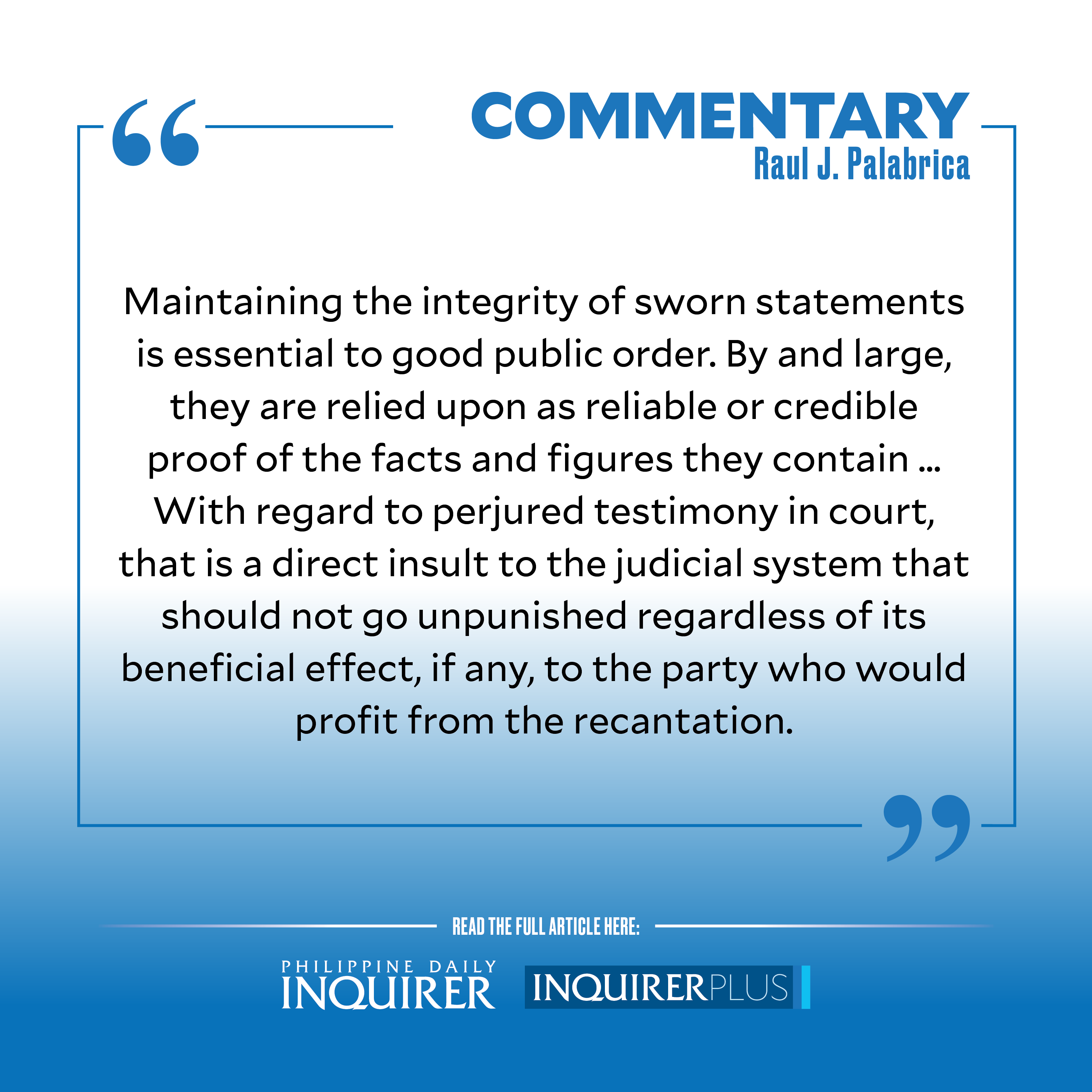Retraction does not excuse false testimony

The credibility that statements made under oath traditionally enjoy in our society suffered some serious damage recently.
A week ago, Jeffrey Tumbado, the former executive assistant of suspended Land Transportation Franchising and Regulatory Board chair Teofilo Guadiz III, said in his affidavit that Guadiz had received millions of pesos in bribes in exchange for the approval of franchises and special route permits, and that the corruption could have reached up to Malacañang.
Two days later, he retracted his statements and said they were unintentional and misguided and were “borne out of impulse, irrational thinking, misjudgment, [and] poor decision-making.”
At about the same time that he backtracked, two former police officers who earlier testified in a drug case against former senator Leila De Lima recanted their testimonies.
They said they were bothered by their conscience and that they did not want her to be a victim of mistrial.
It would be up to the court to decide on the merits or sincerity of the withdrawal of their testimony. As a rule, recantations are not looked with favor by the courts unless there is clear proof that it was given under duress.
At first blush, the impression is created that those three people were motivated by noble intentions when they walked back on their damning statements against Guadiz and De Lima.
Their change of heart could fit into the saying “to err is human, to forgive is divine.”
That may be true if they were vagrants, juveniles, or uneducated at the time they made their statements. Their expression of remorse would be acceptable. After all, our laws look kindly on people with impaired mental faculties or are too young to know the consequences of their errant acts.
But no, those three are mature and educated men who are wise to the ways of the world, more so the former police officers, and they knew very well that making false sworn statements or lying in court could result in severe penal and monetary consequences.
Under Republic Act No. 11594, any person who knowingly makes untruthful statements under oath or offer false testimony in any judicial or official proceeding could face a prison term of from six to 10 years.
If the offender happens to be a public officer or employee, he or she shall also pay a fine of not more than P1 million and shall be perpetually disqualified from holding any elective or appointive position in the government.
Belatedly saying “oops, I made a mistake, sorry about that” will not excuse or erase the liabilities that immediately arise from making false sworn testimonies or committing perjury in court.
Once the lies had been said publicly, and in the case of De Lima, had formed part of court proceedings, the emotional and reputational damage to the person at the receiving end, including his or her family, is already inflicted and suffered. The harm has been done.
In this age of social media, when a false testimony is posted, it could go viral and draw comments that would subject its victim to trial by publicity or be looked at as the devil incarnate.
That post would remain in cyberspace forever unless its source or the search engine concerned takes it down. Until then, the slurs shall remain available for the rest of the world to read and comment on.
Countless lives had been ruined (and even lost), reputations tarnished, and professional careers destroyed by unfounded or defamatory statements by people who think freedom of speech gives them the right to make fun of or put down other people.
The “I was bothered by my conscience” excuse is as trite as the claim of having acted in good faith, or was not motivated by malice or spite. Those are lame excuses that can be invoked without batting an eyelash.
Whether or not the appeal for forgiveness is sincere or simply a means to avoid suffering the consequences of the false testimony is a big question mark.
Maintaining the integrity of sworn statements is essential to good public order. By and large, they are relied upon as reliable or credible proof of the facts and figures they contain. When taken at their face value, there would be no need to ask for supporting documents.
With regard to perjured testimony in court, that is a direct insult to the judicial system that should not go unpunished regardless of its beneficial effect, if any, to the party who would profit from the recantation.
—————-
Comments to rpalabrica@inquirer.com.ph





















